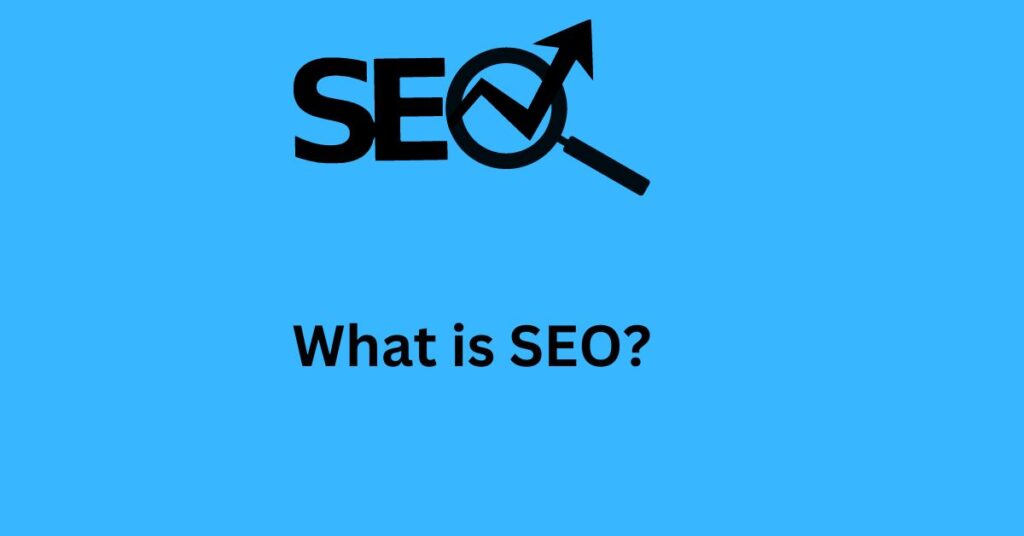Do you interested to know What is SEO?:In today’s digital age, having a strong online presence is crucial for businesses and individuals alike. Whether you’re running an e-commerce store, a blog, or a corporate website, you need to ensure that your content is visible to your target audience. That’s where search engine optimization (SEO) comes into play. In this article, we will explore the world of SEO, its importance, and how you can optimize your website to rank higher in search engine results pages (SERPs). SEO Expert is Also Known as SEO( search engine optimisation specialist?
In this article, I will discuss what is SEO.?
Table of Contents
What is SEO?
SEO, short for search engine optimization, is the practice of improving the visibility and ranking of a website in search engine results. When users search for specific keywords or phrases on search engines like Google, Bing, or Yahoo, they are presented with a list of relevant web pages. SEO techniques aim to optimize a website’s content, structure, and other factors to ensure that it appears higher in these search results.what is SEO

The Importance of SEO
Having a well-optimized website can provide numerous benefits, both for businesses and individuals. Here are some key reasons why SEO is essential:what is SEO
1. Increased Organic Traffic
Ranking higher in search engine results leads to increased visibility and, consequently, more organic traffic to your website. When your website appears on the first page of search results, users are more likely to click on it, resulting in a steady stream of potential customers or readers.
2. Improved User Experience
SEO is not only about optimizing for search engines but also enhancing the overall user experience. By following SEO best practices, such as improving website speed, mobile responsiveness, and easy navigation, you can provide a seamless experience for your visitors, keeping them engaged and coming back for more.
3. Brand Credibility and Authority
Websites that rank higher in search results are often perceived as more credible and trustworthy by users. Implementing effective SEO strategies can help build your brand’s reputation, establish authority in your industry, and gain the trust of your target audience.
4. Competitive Edge
In today’s competitive online landscape, SEO can give you a significant edge over your competitors. By outranking them in search results, you can attract more customers, generate leads, and ultimately grow your business.
How Search Engines Work
To understand SEO better, it’s essential to grasp the basic workings of search engines. When a user enters a query in a search engine, it performs a complex process to deliver the most relevant and high-quality results. Here’s a simplified overview:
- Crawling: Search engines use automated bots called crawlers or spiders to browse the web and discover web pages. These bots follow links from one page to another, gathering information about the content and structure of each page they visit.
- Indexing: After crawling, search engines index the collected information, creating a massive database of web pages. This database allows search engines to quickly retrieve relevant results when users perform a search.
- Ranking: When a user enters a search query, the search engine’s algorithm analyzes the indexed pages and determines their relevance and quality. Based on various factors, including keywords, backlinks, and user experience, the search engine ranks the pages, presenting the most relevant ones at the top.
Types of SEO
On-Page SEO
On-page SEO refers to optimizing individual web pages to improve their visibility and rank higher in search results. Here are some essential on-page SEO techniques:
1. Keyword Research
Effective keyword research is the foundation of any successful SEO campaign. Identify relevant keywords and phrases that your target audience is likely to use when searching for your products or services. Use keyword research tools like Google Keyword Planner or SEMrush to discover high-ranking and low-competition keywords.Check here to know more about keyword research.
2. Title Tags and Meta Descriptions
Title tags and meta descriptions are HTML elements that provide concise information about a web page. Use relevant keywords in your title tags and craft compelling meta descriptions that entice users to click on your link.
3. Content Optimization
Create high-quality, informative, and engaging content that caters to your target audience’s needs. Use your target keywords naturally within the content, but avoid keyword stuffing. Optimize headings, subheadings, and paragraphs for readability and clarity.
4. Image Optimization
Optimize your images by reducing their file size, using descriptive file names, and adding alt tags. This helps search engines understand the context and relevance of your images. Please check the full to guide how to optimize your Image.
5. URL Structure
Ensure your URLs are concise, descriptive, and include relevant keywords. A clear and organized URL structure makes it easier for search engines and users to understand your website’s content.
Off-Page SEO
Off-page SEO refers to optimization efforts that occur outside of your website, aiming to improve its online reputation and authority. Here are some essential off-page SEO techniques:
1. Link Building
Link building involves acquiring backlinks from other reputable websites to improve your site’s credibility and authority. Seek opportunities for guest posting, influencer collaborations, and creating shareable content to attract natural backlinks.
2. Social Media Engagement
Engage with your audience on social media platforms by sharing valuable content, responding to comments and messages, and building a strong online community. Social signals, such as likes, shares, and comments, can indirectly impact your website’s visibility and organic traffic.
3. Online Reviews and Citations
Encourage satisfied customers to leave positive reviews on reputable review platforms. Additionally, ensure your business information, such as name, address, and phone number (NAP), is consistent across online directories and citations. This helps improve your local search visibility.
Conclusion
In conclusion, SEO (Search Engine Optimization) is a vital digital marketing strategy that aims to enhance a website’s visibility and organic (non-paid) search engine rankings. It involves optimizing various aspects of a website, such as content, keywords, meta tags, and backlinks, to make it more appealing to search engines and improve its chances of appearing higher in search results.if you have any question about what is SEO then ask me in te comment section.
Frequently Asked Questions (FAQs)
Q: what is SEO?
A: For beginners, focusing on keyword research, on-page optimization, and creating high-quality content are the fundamental SEO strategies to prioritize. By understanding your target audience and providing valuable information, you can lay a strong foundation for your SEO efforts.
Q: How long does it take to see results from SEO?
A: SEO is a long-term strategy, and it takes time to see significant results. Generally, it can take several months to a year to observe noticeable improvements in search rankings. However, consistent effort and adherence to best practices will gradually yield positive results.
Q: Is SEO a one-time process?
A: No, SEO is an ongoing process that requires continuous optimization and monitoring. Search engines regularly update their algorithms, and competitors may also employ SEO strategies. To maintain and improve your search rankings, it’s crucial to stay updated and adapt to evolving trends.
Q: Are paid ads a substitute for SEO?
честные казино с быстрыми выплатами
бездепозитные бонусы казино
играть в лучшем казино на деньги
база казино с бездепозитным бонусом
онлайн казино России
casino oyunu
A: Paid ads, such as Google Ads or social media advertising, can provide immediate visibility and traffic. However, they are not a substitute for SEO. While paid ads can deliver short-term results, SEO focuses on organic, sustainable growth and long-term success.
Q: What is the role of backlinks in SEO?
A: Backlinks play a crucial role in SEO as they indicate to search engines that your website is trustworthy and authoritative. High-quality backlinks from reputable websites can boost your site’s visibility and improve its chances of ranking higher in search results.



